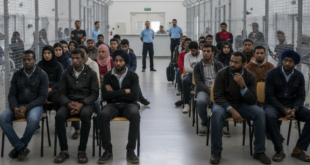Students fleeing the war in Ukraine should be able to continue their studies in Hamburg even if they come from a third country, the city’s authorities have now decided.
Hamburg, one of Germany’s 16 federal states, now issues a 6-month provisional residency right to non-Ukrainian students from Ukraine.
Speaking in an interview with Hamburg Journal, a spokesperson of the city, Frank Reschreiter, said students must be able to prove that they were students in Ukraine when the war broke out.
What you should know about the offer
Refugee students who are third-country nationals will receive a paper called Fiktionsbescheinigung under the following conditions:
- they must be able to identify themselves with a passport bearing a residence permit of Ukraine
- they must present a document showing that they were enrolled in a higher education institution in Ukraine at the time the war broke out
Students who had interrupted their studies in Ukraine at the time of the outbreak of the war will not be eligible for the residence permit.
The Fiktionsbescheinigung is valid for six months and it entitles the holders to
- welfare benefits according to the Asylum Seekers’ Benefits Act,
- enrolment in health insurance scheme
- a work permit.
[A Fiktionsbescheinigung is issued if a decision has not yet been taken on an applied-for residence title or if the decision could not yet be taken. It is therefore a provisional right to stay in Germany.]
During the 6-month validity of the certificate, the Federal Agency for Migration and Refugees (BAMF) will examine, on a case-by-case basis, whether the applicants can return to their country of origin. This means that applicants may receive one or several requests to appear before the BAMF during this period.
Students who are able to fulfil the certain conditions within or at the end of the six months will be eligible for a residence permit for the purpose of studying or work, for example.
To be eligible for the residence permit, they must prove that they
- have secured their livelihood (this can be proved by showing a regular income of €861 per month earned through work or a blocked bank account or a scholarship)
- have a university admission or a work/training contract
- possess good German language skills
Anyone who cannot credibly fulfil these conditions after the 6 months have expired will not be granted an extended residence title but will be requested to leave the country voluntarily or, alternatively, be returned with the help of the German state (deportation). The consequence of deportation is an entry ban of at least 7 years.
According to the European Temporary Protection Directive, which entered into effect on 4 March 2022, Ukrainian refugees do not have to go through a normal – usually lengthy and bureaucratic – asylum procedure in Germany and all other EU countries. Instead, they automatically receive a residence status.
This residence status – called “temporary protection” – is initially valid for one year and can be automatically extended to a cumulative maximum of three years. In Germany, the Directive is implemented through Section 24 of the Residence Act.
However, the legal residency options for third-country nationals, such as international students, resident in Ukraine at the time the war broke out are more complicated than for Ukrainian nationals.
For example, third-country nationals with a temporary or permanent residence permit in Ukraine can obtain a residence title pursuant to Paragraph 24 of the Residence Act if a return to their respective country of origin is impossible.
The Federal Ministry of the Interior specified how this “impossibility” is to be understood in a circular dated 14 April 2022. As a rule, persons with a permanent residence title in Ukraine are assumed to be unable to return to their country of origin.
Persons with a temporary residence title in Ukraine, on the other hand, must individually explain why a return is not possible (reasons may include political persecution, wars or personal life-threatening circumstances). For persons from Syria, Afghanistan and Eritrea, it is generally assumed that return is impossible.
The Hamburg policy, brought about by, among others, the excellent advocacy work done by Irene Appiah, a councillor in the city, comes as a big relief for African students who have been worried about their fate. The opportunity offered by Hamburg now enables those who are registered in the city to immediately start looking for work and enrol in a language school.
Hamburg has been reported to be working for the adoption of its policy by other federal states in Germany.
Femi Awoniyi
 THE AFRICAN COURIER. Reporting Africa and its Diaspora! The African Courier is an international magazine published in Germany to report on Africa and the Diaspora African experience. The first issue of the bimonthly magazine appeared on the newsstands on 15 February 1998. The African Courier is a communication forum for European-African political, economic and cultural exchanges, and a voice for Africa in Europe.
THE AFRICAN COURIER. Reporting Africa and its Diaspora! The African Courier is an international magazine published in Germany to report on Africa and the Diaspora African experience. The first issue of the bimonthly magazine appeared on the newsstands on 15 February 1998. The African Courier is a communication forum for European-African political, economic and cultural exchanges, and a voice for Africa in Europe.

































